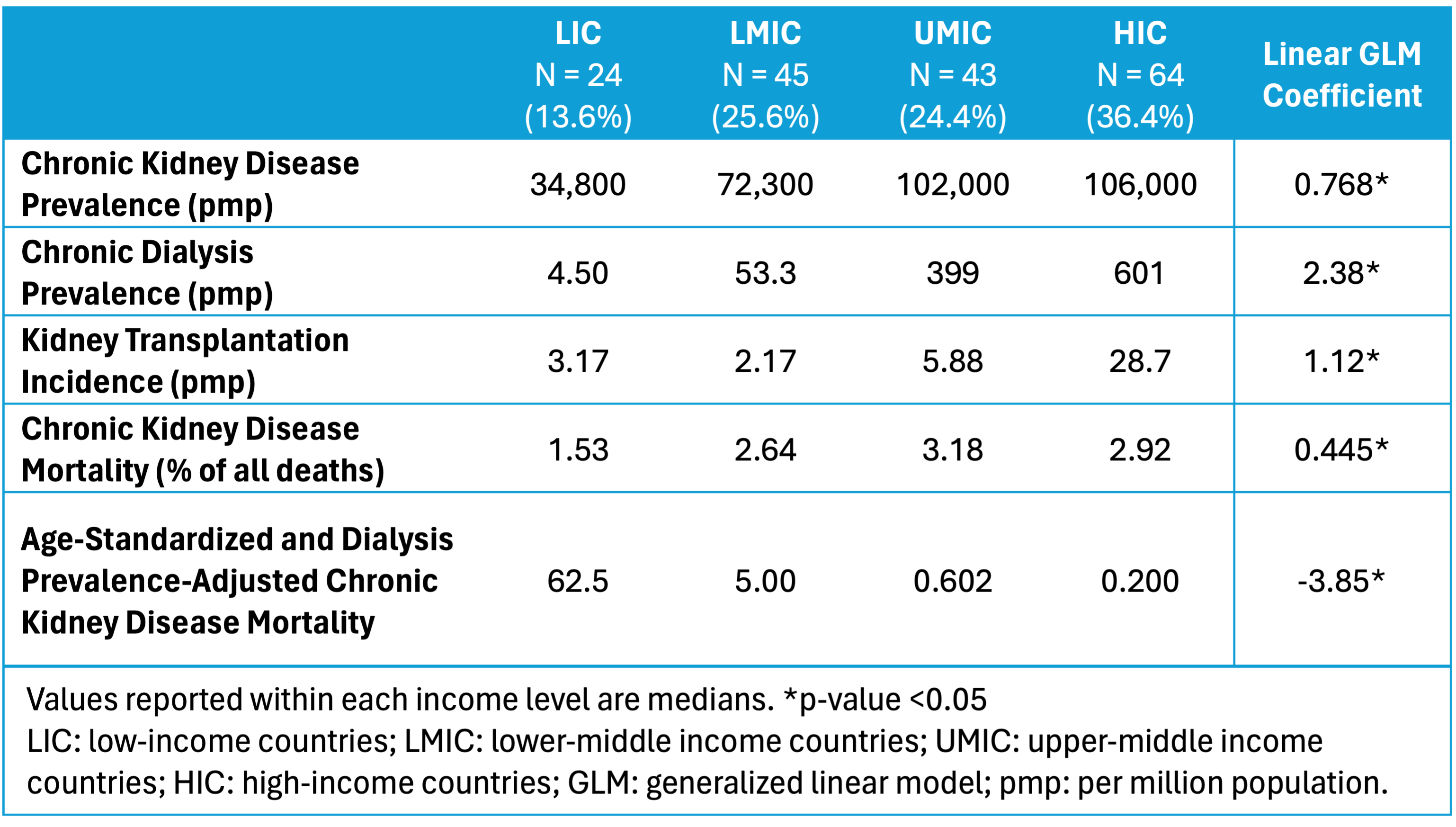Chronic kidney disease: Measuring global burden and effectiveness of treatment
Alan Zambeli-Ljepović1, David Thomson5, Elmi Muller10, Mekdim Siyoum7, Fransia Arda8, Frank Asiimwe9, Doruk Ozgediz3, Somkanya Tungsanga6, Peter G Stock2, John Rose4.
1Surgery, University of California, San Francisco, San Francisco, CA, United States; 2Abdominal Transplant, University of California, San Francisco, San Francisco, CA, United States; 3Pediatric Surgery, University of California, San Francisco, San Francisco, CA, United States; 4Plastic Surgery, University of California, San Francisco, San Francisco, CA, United States; 5Transplant, University of Cape Town, Groote Schuur Hospital, Cape Town, South Africa; 6Nephrology, University of Alberta, Edmonton, AB, Canada; 7Surgery, Saint Paul's Hospital Millennium Medical College, Addis Ababa, Ethiopia; 8Urology, Muhimbili University of Health and Allied Sciences, Dar es Salaam, Tanzania, United Republic of; 9Urology, Mulago National Referral Hospital, Kampala, Uganda; 10Faculty of Medicine and Health Sciences, Stellenbosch University, Stellenbosch, South Africa
Introduction: As dialysis and transplantation programs work to address the increasing prevalence of chronic kidney disease (CKD, >850 million worldwide in 2023), it is crucial to identify reliable measures to monitor their effectiveness and progress. Existing studies use inconsistent metrics of mortality and have not assessed treatment effectiveness on a population level. We therefore aimed to compare different metrics of mortality and their relationship with national income level, CKD prevalence, and dialysis and transplant volumes.
Methods: From the Institute for Health Metrics and Evaluation, the International Society of Nephrology, and the Global Observatory on Donation and Transplantation, we aggregated country-level data on World Bank income level, per-capita gross domestic product adjusted for purchasing power parity (GDP), CKD prevalence, chronic dialysis prevalence, kidney transplantation (KT) incidence, and CKD-specific mortality (CKD mortality). We used uni- and multivariable generalized linear models (gamma with log-link function, alpha = 0.05) to examine relationships among the variables.
Results: Data were available for 176 (90.2%) of the world’s countries: 24 low-income (LICs), 45 lower-middle income (LMICs), 43 upper-middle income (UMICs), and 64 high-income countries (HICs). Data completeness averaged 69.3%, 83.2%, 88.6%, and 86.8%, respectively.
CKD prevalence, dialysis prevalence, and KT incidence increased with income level (Table 1). CKD mortality, however, had an inverse relationship with income level depending on the metric used: measured as a proportion of all deaths, CKD mortality increased with income level, while age-standardized and dialysis prevalence-adjusted CKD mortality decreased with income level.

Unadjusted CKD mortality increased with CKD prevalence across all income levels. Prevalence-adjusted mortality, however, increased with CKD prevalence among HICs but decreased with CKD prevalence among LICs. CKD mortality decreased with unadjusted dialysis prevalence and KT incidence. After GDP adjustment, CKD mortality only decreased with KT incidence, not with dialysis prevalence (Figure 1).

Conclusions: On a global scale, the relationship between CKD mortality and income level varies depending on the mortality metric used. Regardless of GDP, however, countries with higher kidney transplant volumes have lower CKD mortality. Our findings stress the importance of deliberate, standardized selection of metrics for researchers evaluating population-level CKD outcomes and for policymakers allocating resources in constrained environments.
National Institutes of Health T32 grant in implementation science (5R25HL126146-09).
[1] global transplant
[2] metrics
[3] chronic kidney disease
[4] end-stage kidney disease
[5] mortality
[6] kidney transplant incidence
[7] dialysis prevalence
[8] GDP
[9] kidney disease prevalence
[10] policy
